Toxic Mothers: Signs You Have One and What to Do About It

In this article
They say that a mother’s love is pure and unconditional. It’s the stuff of fairytales and movies. But in real life, a mother’s love doesn’t always fit that narrative. Not everyone gets that unconditional mother-child bond.
Sometimes, the relationship with mom hurts. You dread family functions. You find yourself arming for the emotional battle days in advance, knowing that her words will wound you. You avoid taking her calls. Eventually, you break down and call, trying to be the dutiful child, regretting that decision 5 minutes in when the conversation takes its all-too-familiar turn.
It’s a scenario of criticism and guilt, frustration and shame that has played out over and over. You know how it ends. And you’re tired. Are you really being too sensitive, like she says, or is it bigger than that? Could the relationship be toxic?
Moms are among our earliest female role models, strongly influencing our beliefs and behaviors. That influence can continue well into adulthood, influencing your emotional well-being, how you parent, and even your adult relationships. Dealing with a toxic mother, you may be struggling with just how to manage it all without losing your sanity.

Can a relationship with a mother be toxic?
A kind of “love-hate” relationship with mom isn’t an uncommon thing. Moms always think they know best, and you’re just trying to live your best life.
But even with the conflict, you love and respect each other. A toxic relationship takes that dysfunction and disagreement to a whole other level. A toxic relationship leaves you feeling demeaned, disrespected, or misunderstood. In a nutshell, interactions leave you feeling worse instead of better.
Now, to be fair, the relationship with either parent can be toxic, although mothers are more likely to demonstrate toxic behaviors. Any relationship can be toxic – friendships, romantic relationships, and even parental and family relationships. Family relationships can be some of the hardest to navigate because aren’t we “supposed to” love our family? Or at least like them?
Contrary to popular belief, our relationships with our parents are not automatically healthy. Lots of families have issues, and some are quite dysfunctional. It doesn’t automatically make them toxic.
What are the signs of a toxic mother?
Self-centeredness
They’re focused on their feelings and needs, not yours or anyone else’s.
Highly emotional
They’re highly reactive. Drama seems to follow them wherever they go.
TMI
You’re their “best friend”. They share inappropriate or intimate details of their lives with you as if you are their confidante. This can be especially concerning when parents do this with their young children who are emotionally unprepared to deal with adult issues.
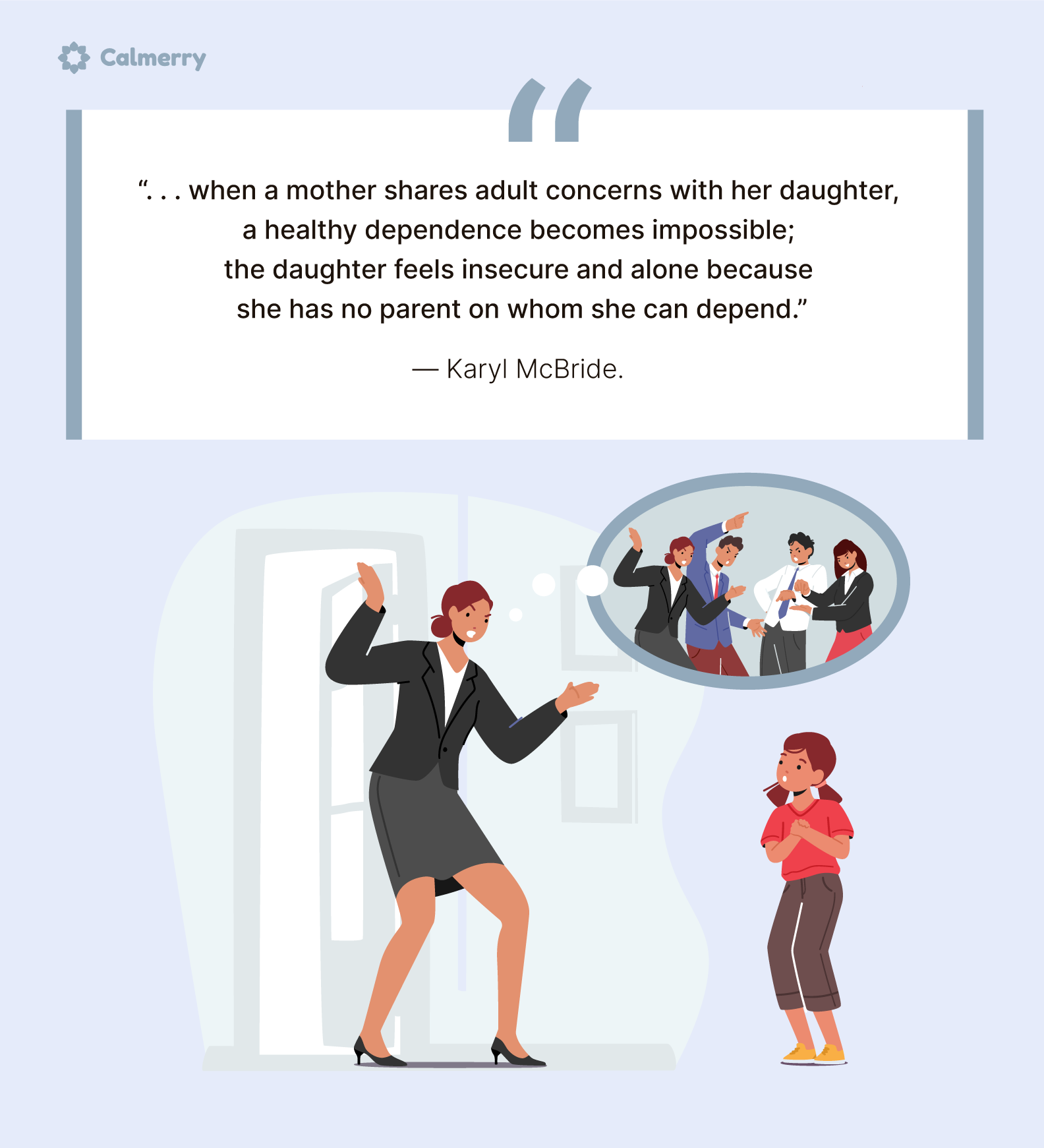
Control
It’s all about getting you to do what they want you to do. Highly manipulative, they may try to use guilt or incentives like money to get you to do as they wish.
Sharp critics
Their words cut to the quick. They tend to be highly critical and leave you feeling as if nothing you do is good enough. If you got a 95% on a test, they want a 100% or even a 100% with extra credit!
No boundaries
There is no respect for your boundaries or space. They may disregard your choices, and feel free to comment on any aspect of your life.
Vicarious pleasure
They may try to live through you and try to be overly involved in what you’re doing.
Abusive behavior can be part of toxic relationships
- Physical abuse – With children, this is a discipline that goes beyond spanking. The response by the parent is disproportionate to the behavior. In adults, it may be physical aggression.
- Verbal abuse – Yelling, name-calling, belittling, blaming, and shaming.
Emotional abuse: It’s the abuse you can’t see, but it can leave wounds that can last for years. - Stonewalling – That’s the dreaded silent treatment. They will give you the cold shoulder and leave you wondering what you did to deserve it.
- Gaslighting – This is a particularly insidious form of emotional abuse. They will do things that can make you second guess yourself and even wonder if you’re losing your mind. The goal is to make you feel responsible for what’s happening.
It’s all enough to make you feel like you’re in a losing battle, and the effects are far-reaching. While all this is happening, it’s taking a toll on your emotional well-being and those around you too.
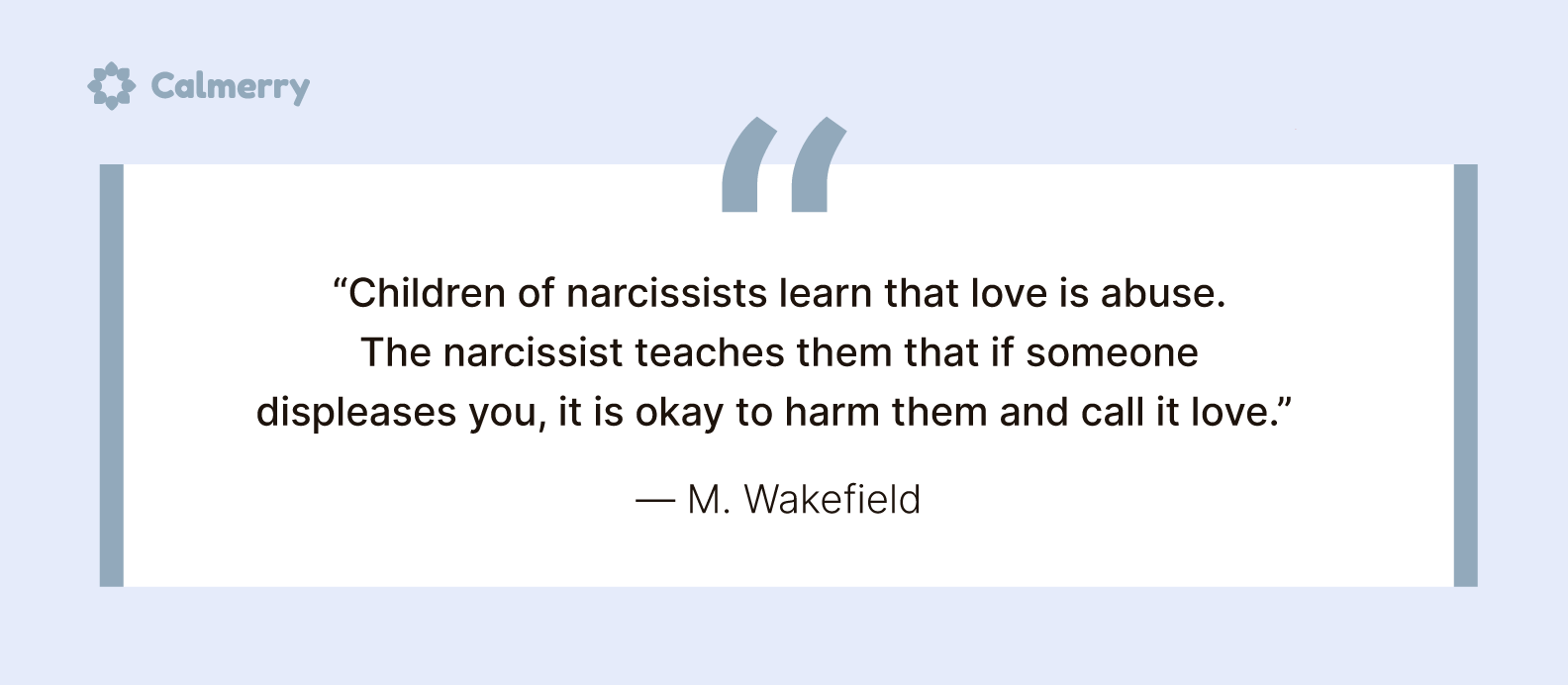
Effects of toxic mothers
You might think that having toxic parents is just annoying and frustrating. Research suggests that the effects of toxic parents go far beyond that. Toxic parent-child relationships are formed early, and their effects are profound and long-lasting.
What’s more, having a mother who displays toxic behavior appears to be more detrimental to their child than if the father is the toxic parent. Living with a toxic mother has also been found to be more detrimental to a young person than having an absent father.
Babies are hard-wired to need their mothers and seek love and nurturing and protection. This early attachment is critical to emotional development and a sense of security and safety. When it doesn’t happen, this lack of attachment (sometimes referred to as insecure attachment) has a profound effect on physical and emotional well-being. Children who experience this insecure attachment struggle with social skills and communication. They tend to be more anxious and less able to deal with stress.
We hope that adulthood will free us from that pain. Sadly, the dysfunction does not magically disappear once you’re grown. The effects of insecure attachment are associated with several mental health issues ranging from mild stress to disorders such as anxiety, depression, OCD, personality disorders, and eating disorders.
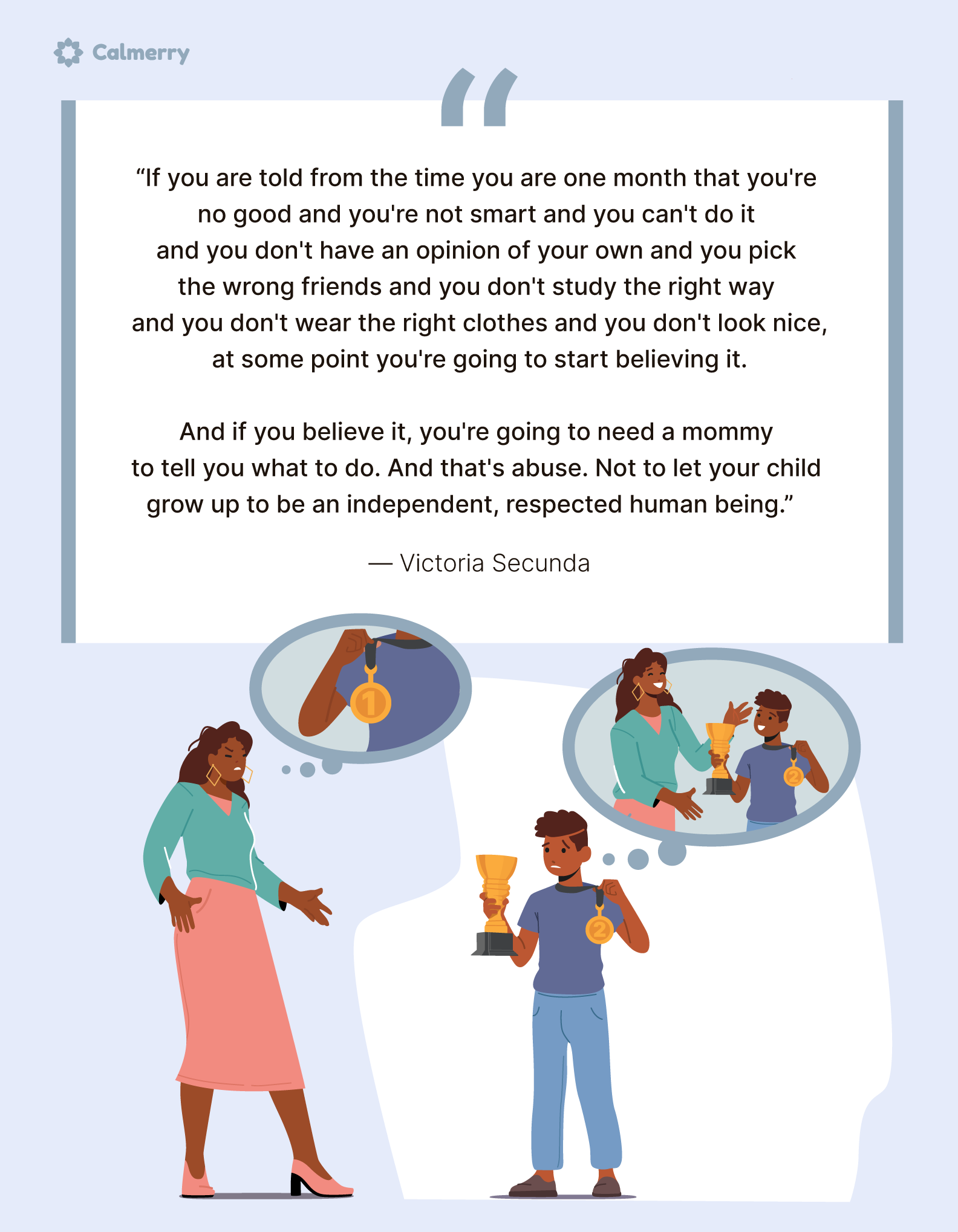
Adulthood tends to bring an awareness of hurt and anger. However, even when your relationship with your mom is fraught with dysfunction and conflict, you still have a need for that love and can spend a lifetime trying in vain to get it.
All of that dysfunction can lead to deep emotional wounds. Those unhealed emotional wounds can create feelings of:
- Low self-esteem, feelings of not being good enough or somehow being “less than”
- Shame, anger, or guilt
- Self-blame – something must be wrong with you for this to happen
- A sense that you have to act or be a certain way to be loveable
These feelings can influence and shape the other relationships you have. Some of those relationship impacts include:
- Guarding your emotions even with those closest to you, expecting the worst in others
- Tolerating poor treatment from others as if it is somehow deserved
- Having a hard time saying NO or fearing the response if you do
- People pleasing and emotionally caretaking others
- Sabotaging yourself and your relationships
- Needing to dominate, and control your life and those in it
Having healthy, secure relationships is difficult when you’ve learned that relationships are unreliable and can be hurtful.
The good news is you can take control of your life. You can heal and learn how to separate yourself from the toxicity.
How to deal with a toxic mother
Moms are supposed to protect us from the hard falls and sharp edges, not create them. That doesn’t always happen. How do you protect your emotional health when it’s your mom that hurts you most? If you find yourself in a toxic mother-child relationship, there are things you can do to protect and heal yourself without demonizing your mother.
Healing begins with the decision to let go. You’re not destined to repeat the same pattern with the people in your life. Your past doesn’t have to control your future. You can give yourself permission to let go of the anger, the shame, and the hurt and to embrace a new beginning.
When you’re ready, here are things you can do to begin that healing process:
Choose how you respond to someone else
Recognize that you cannot change anyone else’s behavior, nor are you responsible for anyone else’s actions. You can change how you respond to someone else.
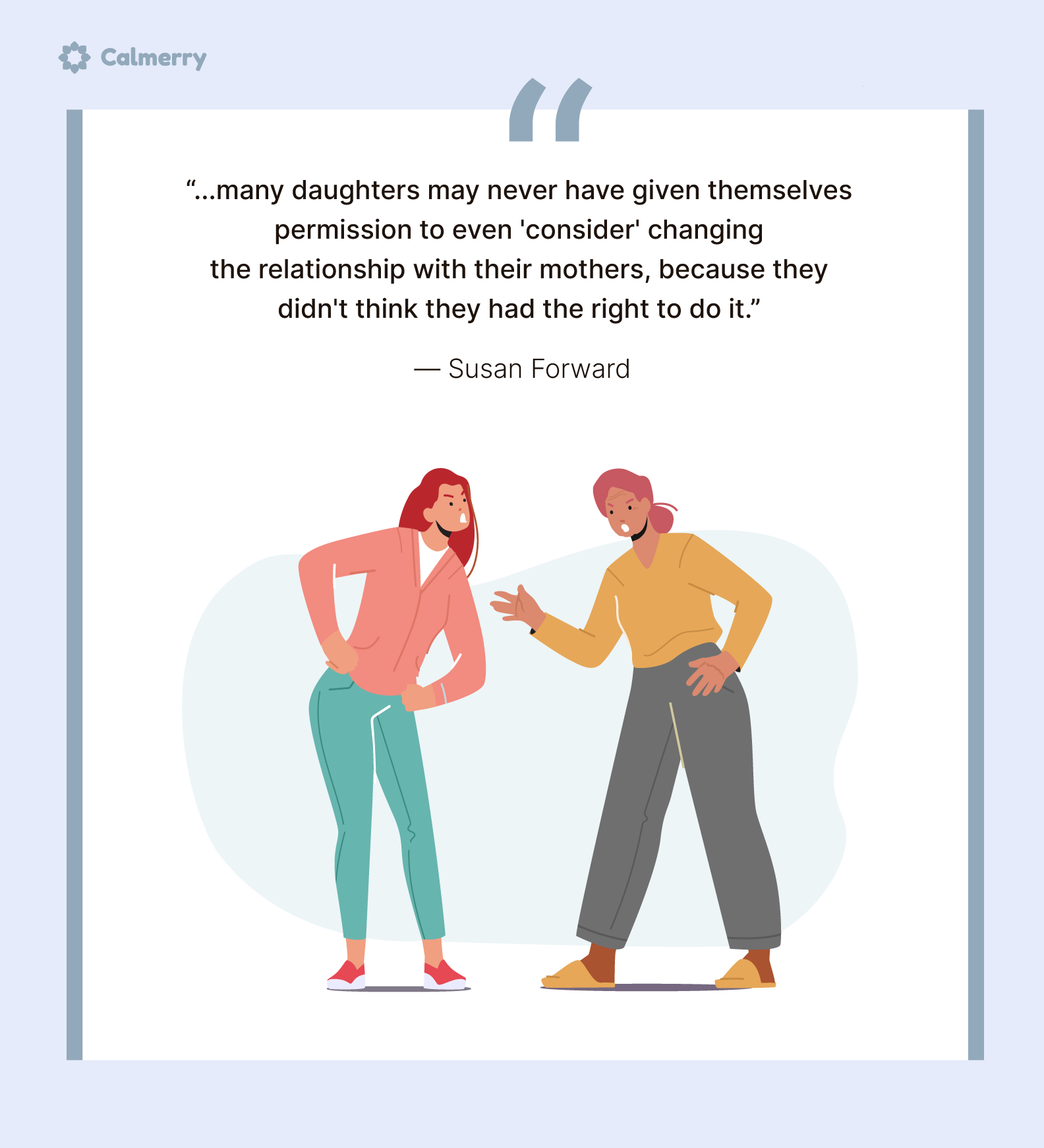
Remember that no one, including your mom, is not “all good” or “all bad”
There will be times when she is loving and caring. You’ll see glimpses of how the relationship could be. That alone is not a reason to stay in an unhealthy situation. It is important, though, to remember that she is human and can make mistakes too.
Set clear, firm boundaries and stick to them
Boundaries create space. Your mom might not like being told what to do, but you have the right to set boundaries that are healthy for you. When she knows you will stand your ground, the pressure to comply with her demands will ease.
Be honest with yourself
You have to be honest about what the past and present are and are not. You cannot change the past, and no amount of “if only” can change that. Your mom may not choose to make changes. You have to be real about what your relationship may look like.
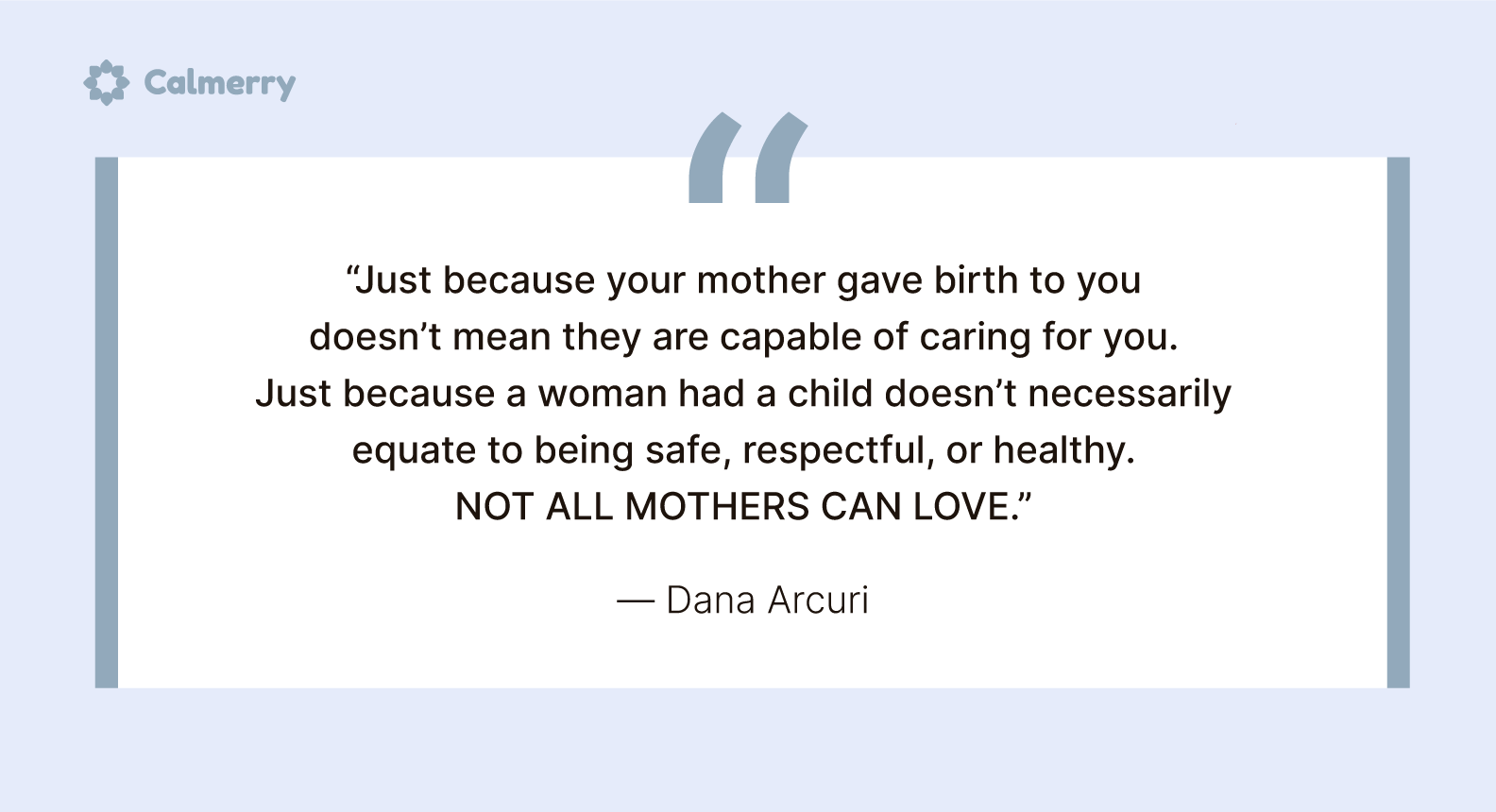
Be mindful of your relationships with others
You may unknowingly be repeating some of the toxic patterns that you have experienced. You may be attracted to people who are similar to your toxic parent, seeking that validation and support you didn’t get from them. It’s a pattern that can repeat over and over, with the happy ending never happening.
Be mindful of your own patterns of behavior with others
You’ve experienced toxic behavior, but you are not destined to repeat it with your own family. Resilience, being about to deal with adversity, is something that can be learned, and you can be the one to break the cycle.
Journal
Writing can be healing and create insight. As you tell your story, you’re able to see your strengths more clearly. Journaling can help improve self-esteem and build resilience.
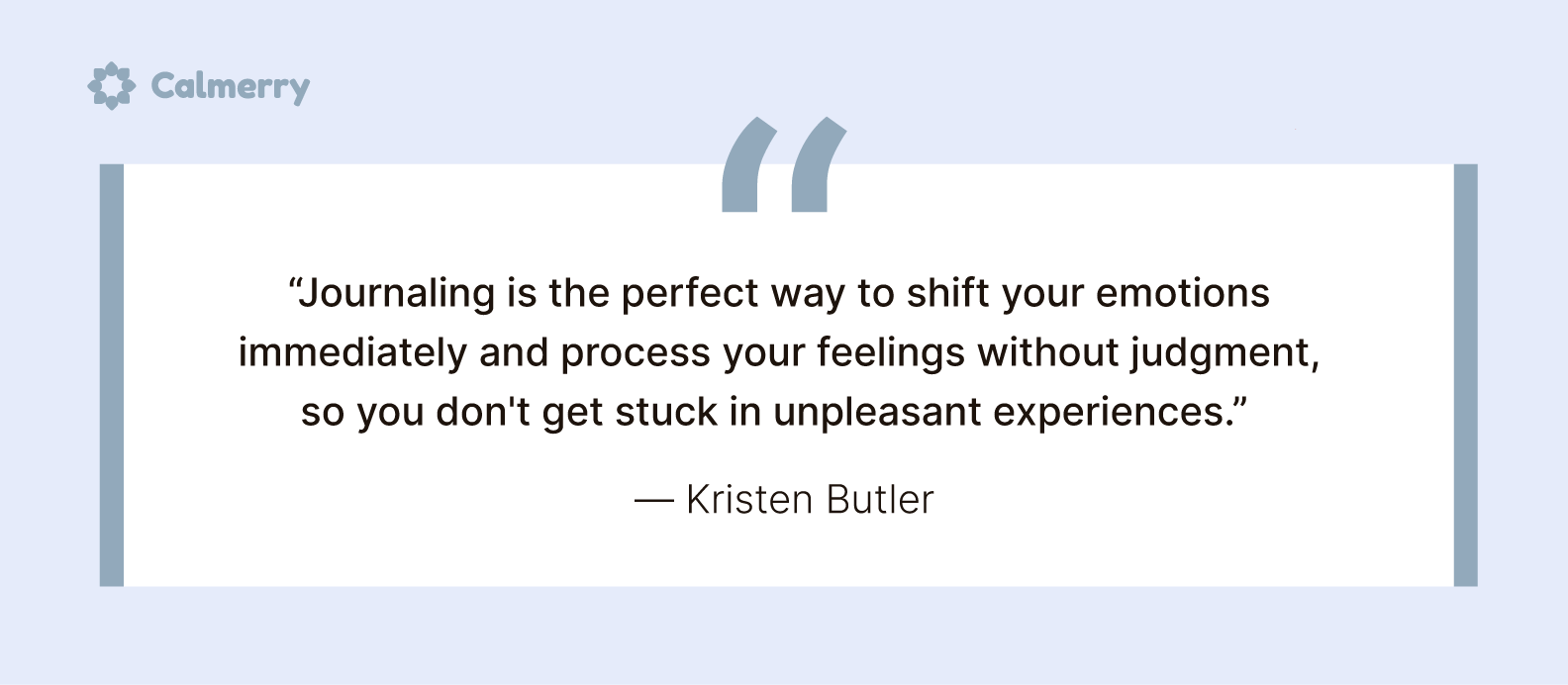
To let go…or not?
Some days, you might think it would just be easier not to see each other at all. This is never an easy decision, and nor should it be. There are times, however, when no matter how much work you do to heal a relationship, the hurt associated with continuing to see each other outweighs the benefits.
Before making a decision like this, it may help to work it through with a therapist who can help you to explore the options and possible consequences of that decision.
Do things that are good for you
Being in a toxic environment can take its toll on you physically and emotionally. Eat well. Get fresh air and exercise. Connect with people who nurture and support you. Do those things that make you feel empowered and centered. Doing good things for your body and mind can help to heal the damage done and increase your resilience.
Give yourself grace
Some days, you’ll have it all together. On other days, you’ll feel like you can’t do anything right. Give yourself grace, and know that you are enough. Everyday. Give yourself permission to try and even to fail. It’s how we learn and grow.
You have the power to heal
Healing a toxic relationship takes time, and it takes patience. You’re undoing a lifetime of negativity that left you feeling scared and doubting your own emotions. Knowing where to begin can feel overwhelming. A trained therapist can help you to work through this complex relationship, learn new ways of coping and find healing and peace.
With the rise in access to therapy via online resources, help is more accessible than ever before. Online therapy allows you to access care when and how it makes sense for you. And online therapy has been shown to be as effective as traditional in-person counseling. When you’re ready, there is help, and there is healing.
online therapy
live video session


